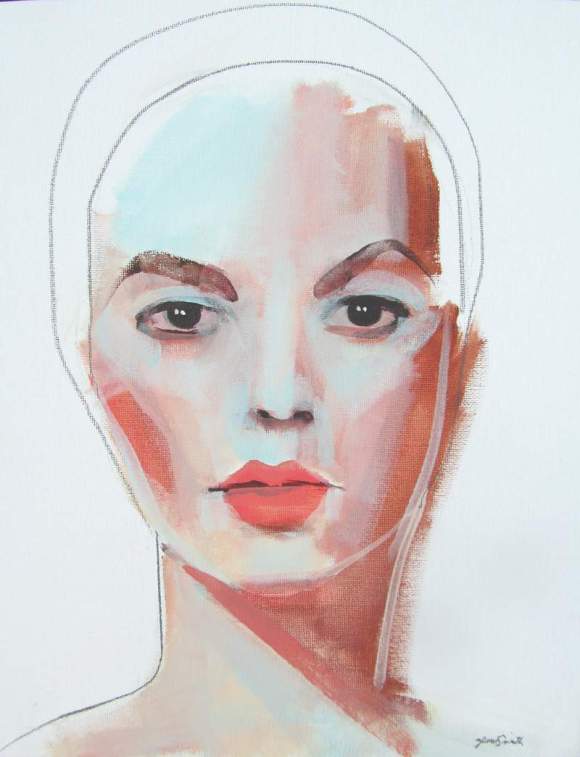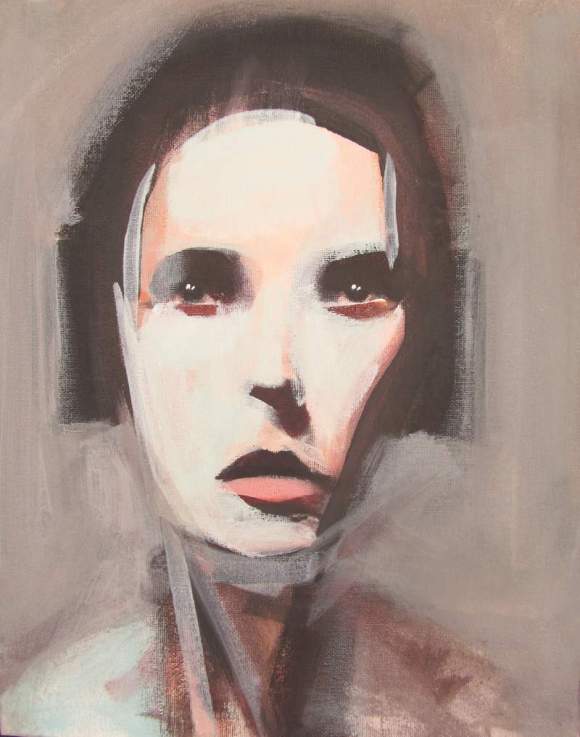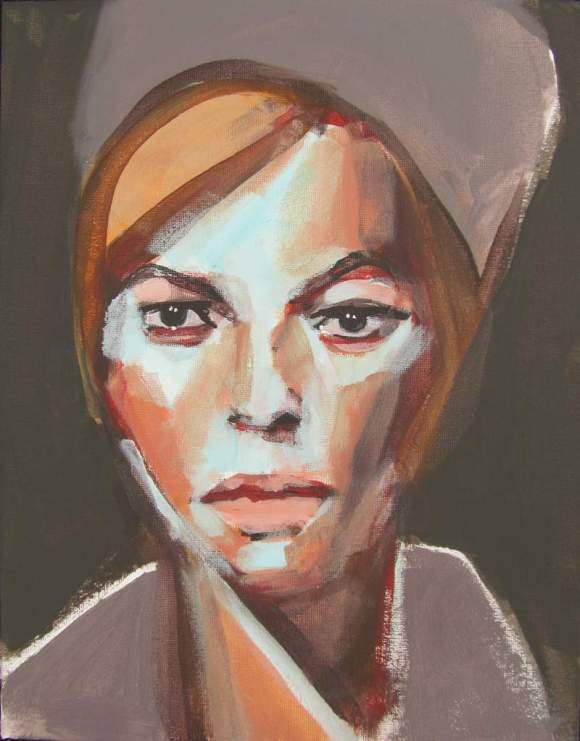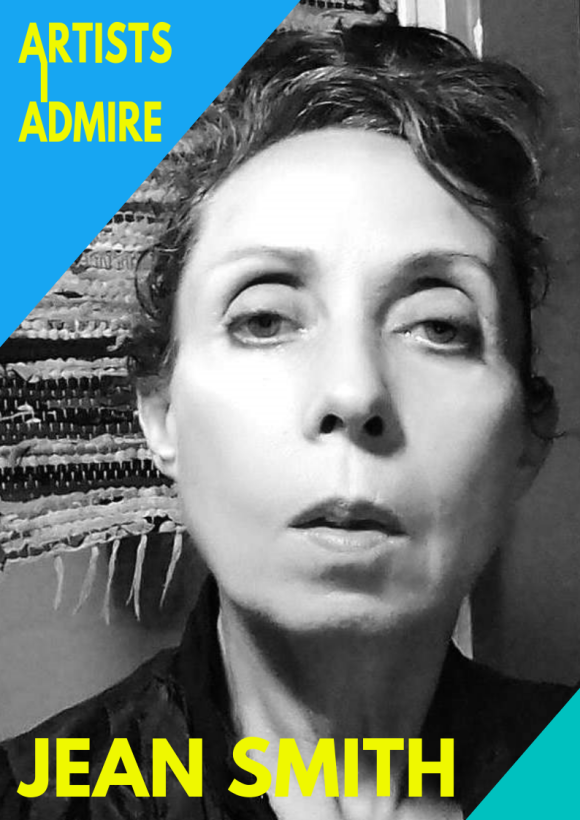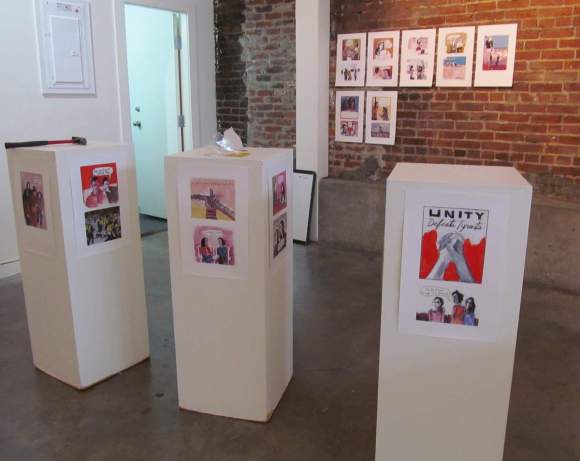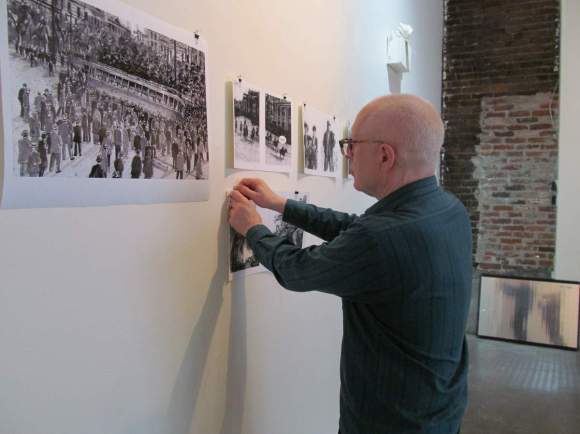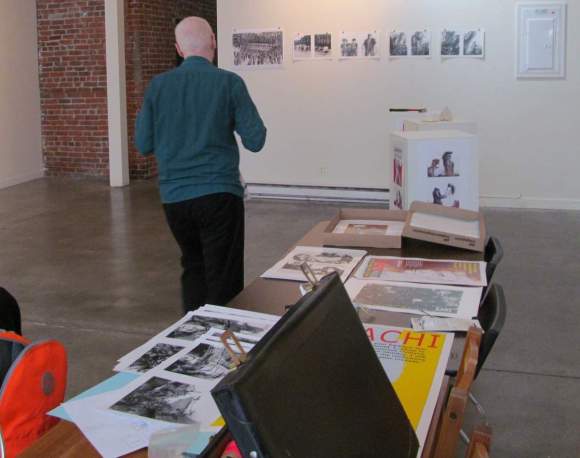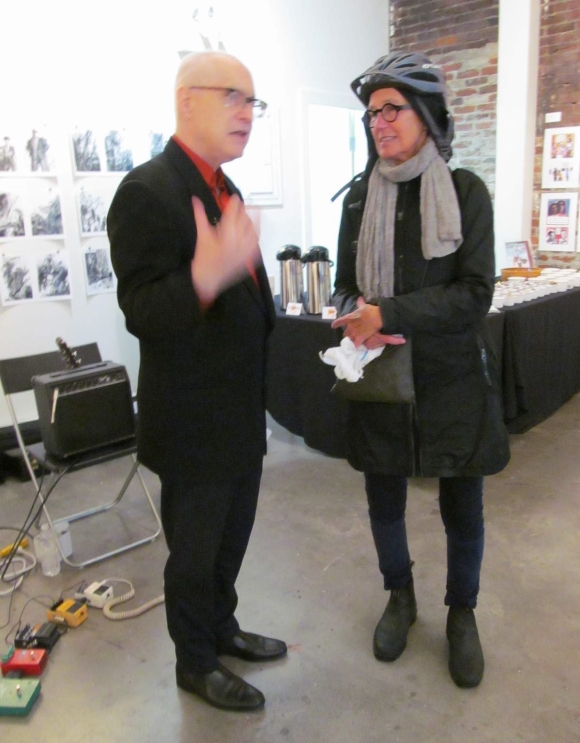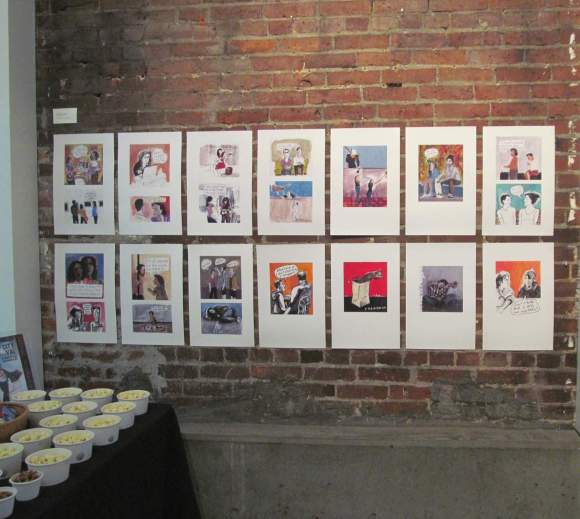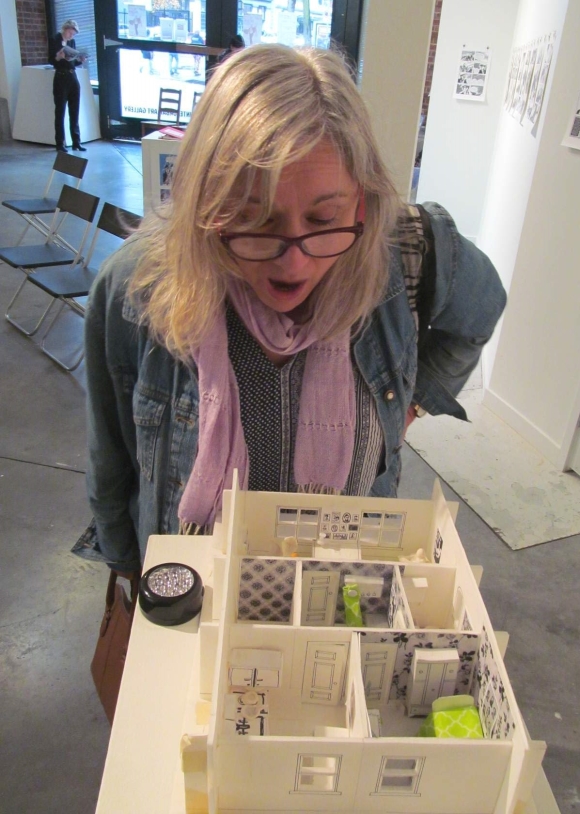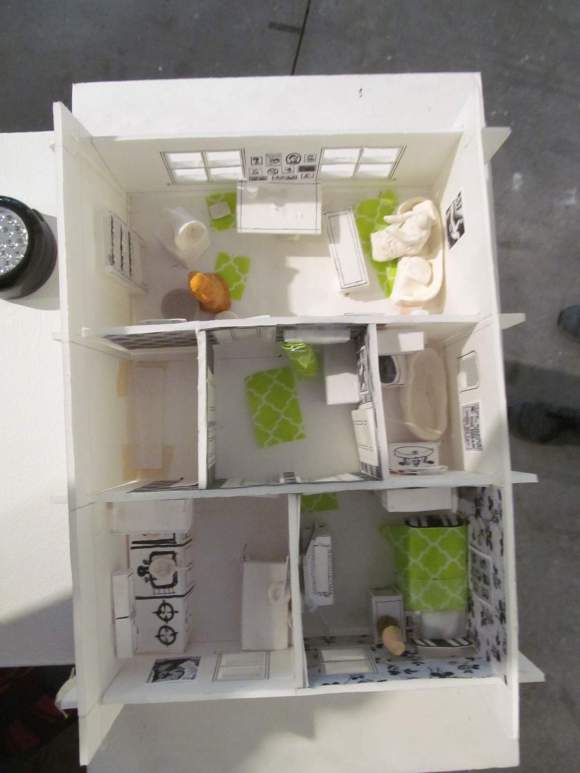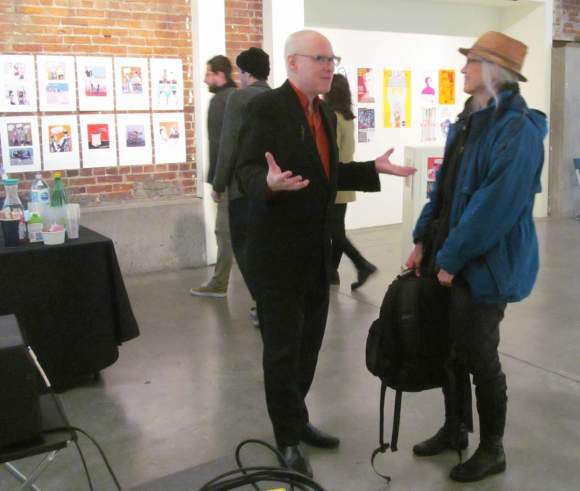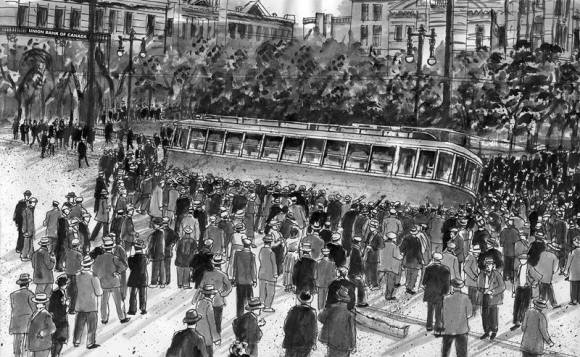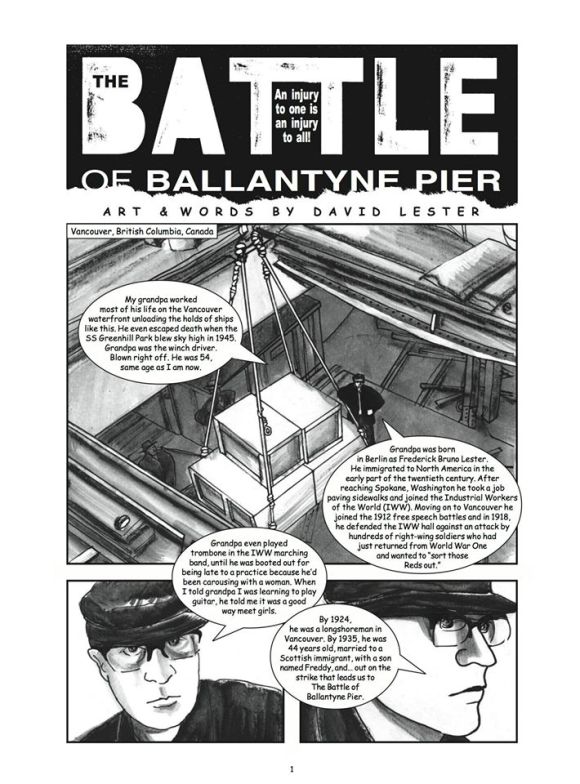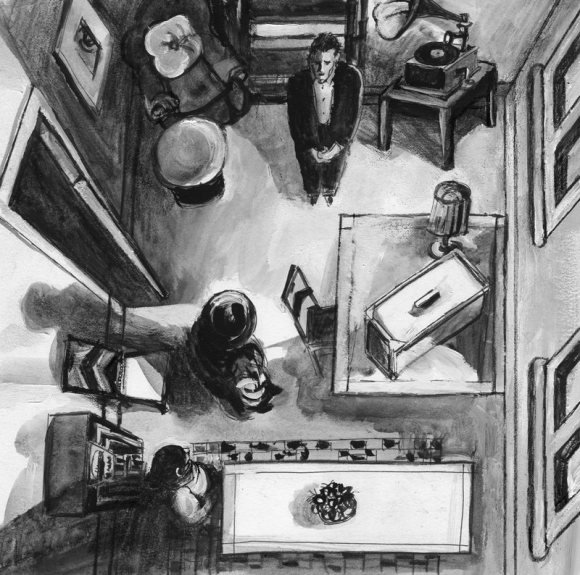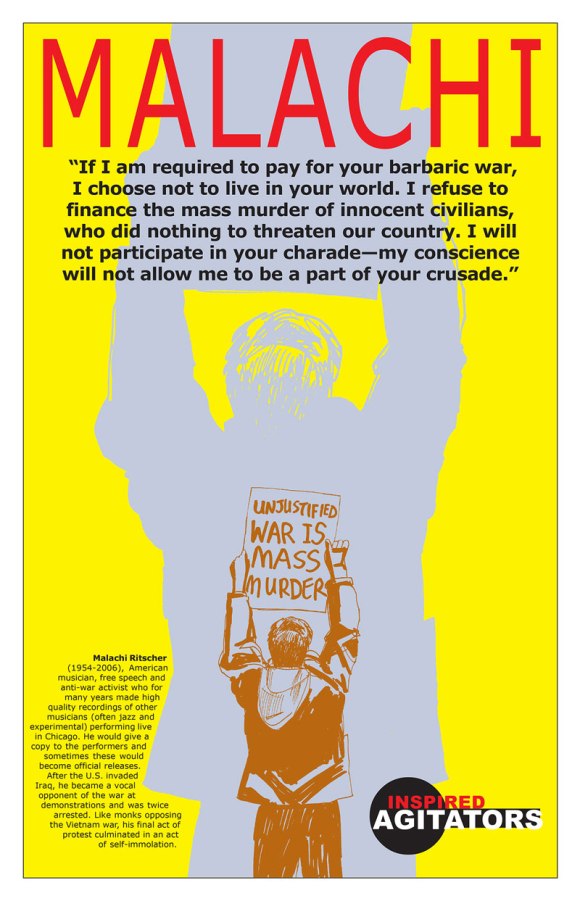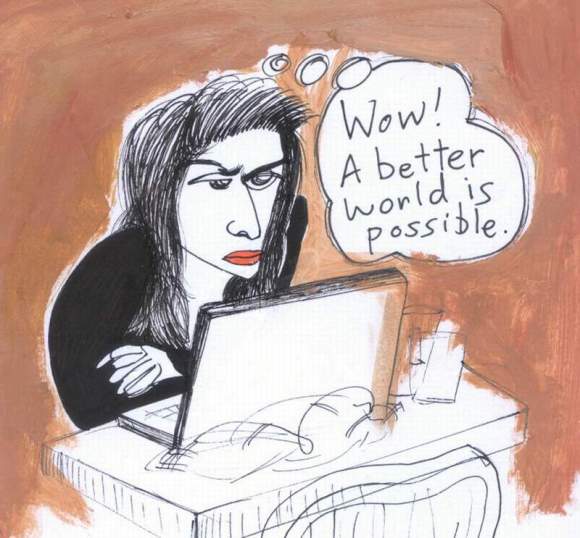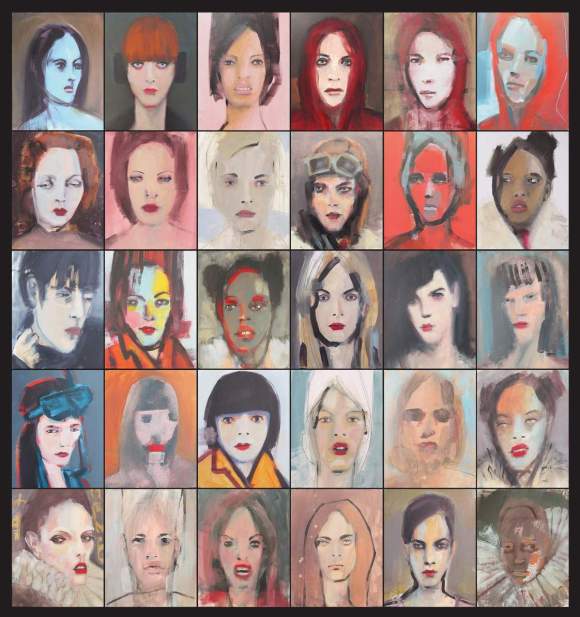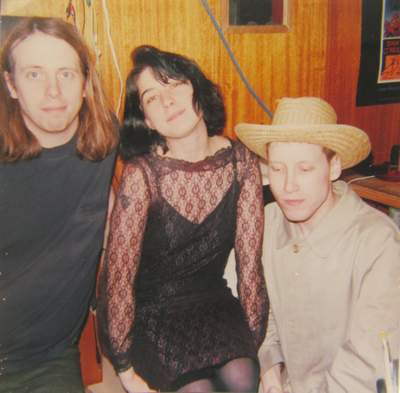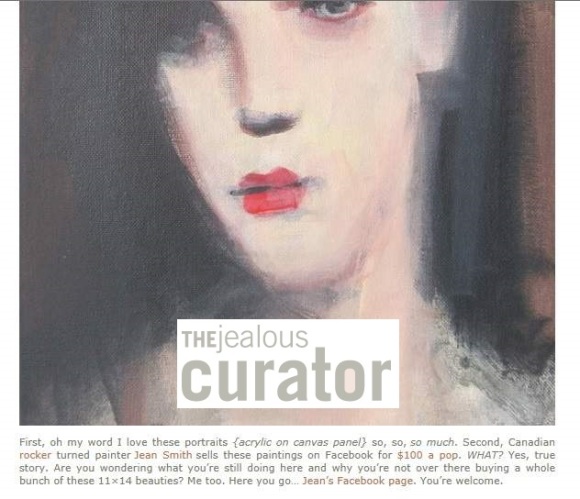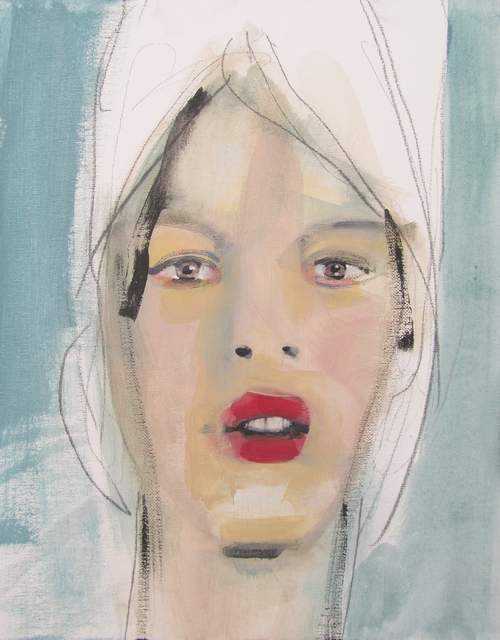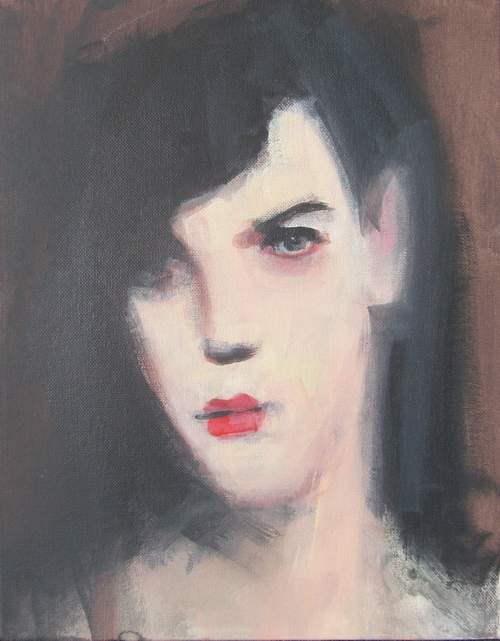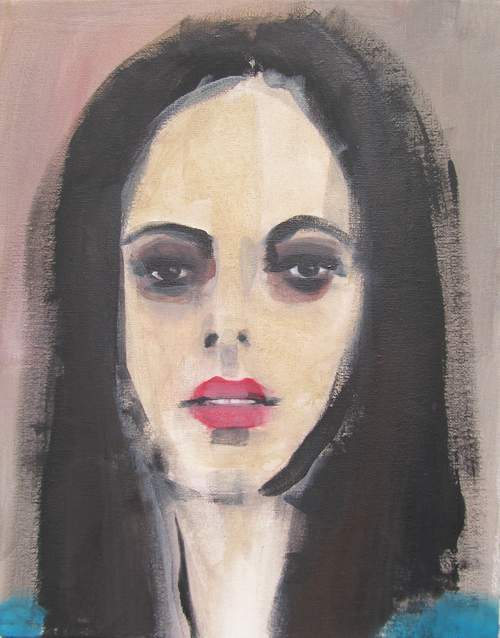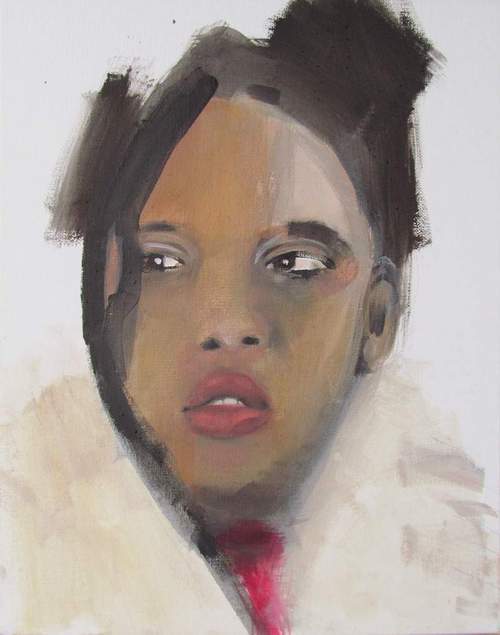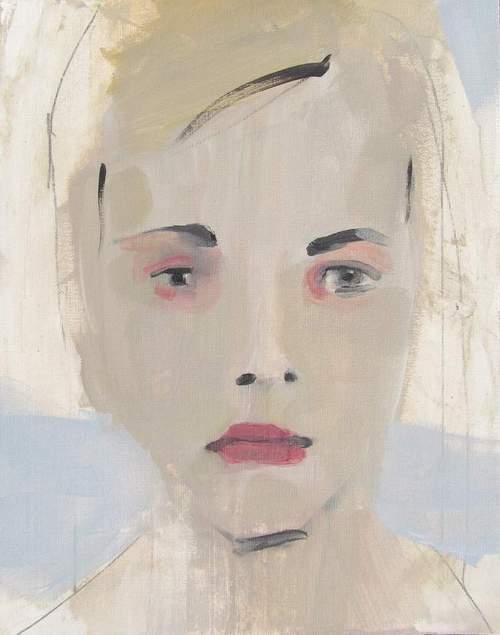Jean Smith talks to The Media about her $100 USD painting series on FaceBook.
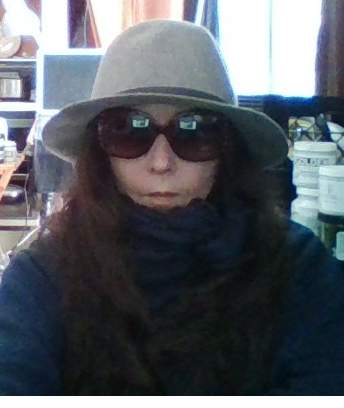
JS:
I grew up with painters. Both my parents are painters, good painters. And I thought I too would go that route, or be what is known as a commercial artist in that time, in that era. So I went to art school for a little bit, but I didn’t really – you know I’d had so much exposure to art growing up that it just didn’t feel like a fit for me. So I went and started Mecca Normal and that became my sort of artistic release in that direction. And I suppose in recent years that the longevity of Mecca Normal is both fabulous and it’s something that’s easy enough to maintain, that doesn’t need a lot of attention, so there’s room for both Dave and I to work on other projects which makes life very interesting, plus we’ve toured, we’ve made the records and that’s not really what one wants to do… you know, repeating the same thing forever. Especially where we’re at, because it’s harder and harder to make the thing work on many different levels. So I have been taking part time jobs. For a number of years I was a fitness technician at Curves gym for women, and that was great because I could interact with the women and talk about the novels that I’d been writing over the last 15 years in solitude. So that worked really well, to have this sort of social conversational level. So I looked for part-time jobs that I thought I would have some kind of benefit hidden away within the structure of the job, even though they’re retail or whatever.
But I’ve been just working in that way, part time, and then devoting the bulk of my time to writing the novels. Then I took a job at Whole Foods, which was horrible. I was a cashier, and I basically – my wrists were just toast. It was Christmas. It was a very small store and I was doing all of the memorizing. The last thing in the world I wanted to do was memorize all those crazy produce codes. I thought I was going into customer service, which at the job previous meant something else. Anyway, so I kind of wrecked my wrists. And I need my wrists for writing and painting and guitar, and chopping my onions, and other things. And so I got out of there and I went to Home Depot, which is a very similar, corporate structure. It was no good either. They had a different way of abusing their employees. They wanted me there at 5 in the morning, 7 days a week, as a part-time worker, watering the plants. And when I said, Well, I’m just not really gonna do that, that doesn’t work for me, they just ignored it.
But right around that time – I’d only had the job a couple of months – I’d started the painting series in February, out of a moment of, I have to say desperation or frustration with these stupid jobs. And that’s why I kind of detailed them, because, you know I don’t mind working. I kind of like the structure, it can be good, right? You can get your social life in, I got my workouts in at Curves. That all was fine. But when you start damaging yourself or putting yourself in harm’s way psychologically or your time’s jeopardized, you really have to be careful that you just don’t fall into that and then there goes any sort of, you know, ability to maintain the purpose for having the stupid job is so you have all your time, most of it, to do what you should be doing, which is the music or the writing or the, in this case, the painting. So, in the dead of winter, I decided I’m just gonna paint 5 paintings a day. I think I said it to Dave out loud, “I’m going to do 5 paintings a day for $100 bucks.” And I thought I would do little landscapes, you know bang those out, and sell whatever number just enough to pay my expenses.
But when I announced it on Facebook, it seemed to be… -I ask Facebook quite a few questions. I don’t know if you see my posts, I know we are friends…
KC:
Yeah I think I do usually.
JS:
Yeah, so I tend to ask Facebook for whatever I need. LAUGHS. So I announced this project and with it, I put up a painting. A portrait. And it sold within a number of hours to an art instructor at a university. And next thing I know, an interior designer in Seattle is saying, “I want to give you the money right now for the next one.” And I went, whoa, whoa, whoa. I wasn’t really planning on doing portraits, I just kind of put up a painting. I’m gonna do a bunch of painting. But the portraits, I just never had any idea ever that people would want portraits of unknown people. It’s not really about the rendition of a specific person. That isn’t the point. And nobody ever asks, who that is. Very rarely do people say, “Oh, that looks like so-and-so.” In fact, if they ever do put that on my Facebook page, I take it down because I want people to be able to look at it in their own way. Instead of saying, “Oh that looks like Christie Brinkley.” And then they’re looking at it like looking for Christie Brinkley. Who needs that?
So it just started with this a huge flurry of energy and there was just an audience. People were kind of clamoring to get them. And I was just shocked and so it began. But I started doing self portraits when I was 13. My dad, as well as being a painter, was an art director. He was flying out of Vancouver to go to New York to work with Vogue photographers. Vancouver was a small town at that point, but he kind of made this his own trek to introduce high level of photography into ad campaigns that were either local or national in Canada. I became fascinated with magazines and images of women. I had terrible acne. I drew all sorts of different colors into my face – purples and greens. They weren’t glamorous by any means. But I was painting. Both my parents would give me their tubes of squeezed out color, brushes they no longer needed, you know, because they were all sort of worn out.
I guess as a teenager I was sort of looking at my face and wondering about the images that my dad was working on professionally of models. All these gorgeous women. I don’t know. I didn’t come to any conclusions. But that’s what I was doing. Also I was grounded a lot for various misdemeanors. LAUGHS. So I was in my room a lot, doing these paintings. And over the years I’ve always tried to do at least one self portrait a year, just an exercise. So that’s basically how it got started, that’s the long version I’ve given you there.
KC:
Keeping it going?
JS:
Well, it’s paying my bills every month. Pretty much exactly. I have fairly low overhead. There have been a couple of months that fell short by a little bit, but then the next month it became a little bit more than I needed. So it’s just evened out for the 8 or so months I’ve been doing it. Right now there seems to be a bit of an upswing. Every month is different, you know. It dried up a bit at the end of the summer when people become preoccupied with realigning their lives I guess. It seems to be good again right now. And then I’m gonna do some sort of activity that might encourage people to consider buying them for Christmas. So there’s that to consider. You know, it isn’t that different from things we’ve done before. When you release an album, in our case, because we’re mainly a DIY outfit, we do a lot of connecting with journalists and radio and doing the interviews because we like communicating in that way because we usually have something more to say than, you know, here’s our album and aren’t we great kind of thing. We’ve always tried to use the opportunity of interviews to talk about feminism or grassroots organizing or what have you. More political sort of content, rather than simply a straight-up band interview. So that brings about pressure I put on myself, probably to challenge myself in painting more political subject matter than the faces of women, which is a bit… sometimes it just strikes me as a funny pursuit. But then again, to be independent and out of the work-force, and maintaining my livelihood by painting is kind of political in and of itself, especially in this day and age. And at this age, I’m 57, being in a band, I don’t think anything more is gonna happen with Mecca Normal that’s really a surprise, let’s say. I don’t think there’s really room for women my age in rock at our level, really, unless you’ve already kind of made it. Would you concur to some degree?
KC:
I mean, yeah, for the most part. Kim Gordon obviously comes to mind.
JS:
But she’s already big. And we didn’t get big. So you know to expect something, that we’re gonna get discovered in some way I just think is highly unlikely. And also, you know, with the painting as well, you do hear – in fact, I was watching that Carmen Herrera documentary the other night and one of her chums was saying that it’s fairly well-known in the art world, in the official art world, that galleries don’t really want to take on new artists over 35. Young and upcoming, there’s a big fascination in culture with what’s new and who’s young and keen and gorgeous and whatever. You know, I mean… there is a certain amount of ageism just built into culture and society overall, that I certainly feel. That I sort of had my time and I should just sort of go away now. I don’t really have anywhere to go. You know I still actually have to pay my bills. It isn’t like I’m a legal secretary, that I’ve had my artistic phase or something. I’ll go do that. So I do have to… you know I’m on the planet. I believe in many ways all of my skills are better than ever and it’s sort of frustrating to find that I’m less. I feel like I have less worth as a woman in general. You know, by appearance I’m certainly invisible in society walking around, women my age are just not visible, really. It’s an interesting transition.
Anyway I’m very happy. I’m probably happier than I’ve ever been. And it’s kind of a funny thing, you don’t expect to be X’d out of where you feel you were because things are getting better. I mean, Mecca Normal is maybe better than ever. And our methods of working are being fine-tuned, and yet there’s less interest. There’s this strange phenomenon that you have to cope with in a way and not let it get to you. Having this success with the painting is something that I will continue with, but I have no idea where it’s going. I really like the idea of keeping the price low. I know I have several people who are in the official art world who tell me I need to raise my prices. That they’re just not in line with what they should be. But I don’t really want to do, you know, if they’re $500, then you’re sitting around, waiting. Maybe you only sell one a month, right? If that. If that. So there seems to be some energy, for people who maybe don’t buy art at all.
KC:
Right. It seems affordable.
JS:
It does seem affordable for people. You know, they kind of wait for one they like. And a lot of artists are buying them, so it’s connecting with people in that way. And artists typically don’t have tons of money, but they’re feeling like it’s affordable and there’s excitement about it. Yeah so it’s all sort of a surprise and I manage to make it as stressful as possible. LAUGHS. Tossing and turning. “Uh, should I do a hat or a no hat?” So it seems to take up all my time.
KC:
How long do you typically spend on each painting?
JS:
You know, I could say 57 years because that’s what goes into it, my entire life experience really. That’s a bit of a cheeky answer and probably not entirely original. But, you know, the more I paint, the faster it gets. If I start to replicate techniques that I’ve discovered and honed, but I don’t really like doing that. I like to learn something new through every painting experience because for me, that’s what it is. A painting is about the time that went into the painting. The time of the painting. The painting itself is almost the byproduct. The painting itself, the noun, is just kind of a token of the time. It’s like a recording, is it about the time the musicians were altogether and the energy and everything that happened in that room, as opposed to a CD of it. To me, a painting is just a record of the time spent painting. You know, I mean, I’m good at knowing when to stop, but I certainly don’t always hit what I want to get out of it right away. So there might be 200 different versions underneath the final piece, really. So it could be anywhere from, you know, an hour and a half to 4 hours, let’s say.
KC:
Are you painting from your mind?
JS:
No I’m always painting from a photograph. I have a monitor right in front of me, almost where you would have a mirror if you were looking up and you’d be seeing the image. I tend to use the same photographs over and over again, but I don’t have any interest really in replicating the specific individual, so they always look different even though they are the same photo. One of which is a trans model, so in quite a few instances, even though the features are very feminine, there’s sort of a gender neutrality or you know, a sense of androgyny that… it’s feminine, let’s say. I think there’s some sort of interest in that aspect of it. I think there’s some sort of interest in that aspect of it. Are you somebody that’s usually interested in art?
KC:
Yeah, I mostly write about art.
JS:
Someone who has been very supportive of me, who you probably know, is Molly Zuckerman-Hartung. I don’t know if I’ve ever met her, but I guess she went to Evergreen (State College in Olympia, Washington) and at some point she gave an interview and somebody asked what she listened to when she was painting and she said, and amongst other things, Mecca Normal. So we became aware of her that way.
KC:
Yep, yep, I know of her work.
David and I have been putting up our art at Mecca Normal shows… in fact, when we were last in Chicago, which was a long time ago, we played at The Empty Bottle and then we put up the art in the upstairs room, the Bottle Top.
KC:
Oh, cool!
Yeah so, we would get to the club really early and put up, you know, maybe 80 pieces of art that we lugged around with us. And some sold, and other times we were just happy to have it up, you know? The places that we would play music, that that was the basis of what we created in the Black Dot Museum of Political Art, which is primarily an online archive of political art that has yet to come to any sort of bricks and mortar sense. But it could. I did apply for funding at one point through the Institute of Museum and Library Services in DC, but just one of our kind of side projects, starting a museum. LAUGHS. You know, it just kind of came up as an idea to kind of corral the political art and the lecture, the classroom event that we do, How Art & Music Can Change the World, that we’ve been doing since about 2003. So we show images of my art, Dave’s art, and talk about how we’ve changed the world. And however bombastic that sounds, we like to talk about the whole riot grrrl thing and why that was important. And we are frequently cited as an inspiration to the co-founders of riot grrrl. With the idea that people can use art for social, part of the social movement – progressive social change – even though typically people are naysayers and they feel that you can’t change anything. So why even bother trying?
KC:
Right. Right, talk about Bikini Kill. How does that make you feel to have inspired a huge movement?
JS:
Well I’m sure that there were many factors that inspired them, as well as their own relationships and the talent that they had. So, we’re just a bit of a — you know, to us, it’s a big deal to be able to say that. It’s helpful to have context. I mean when we started I had no idea that would be kind of our legacy, or the context, but it is. When we started, we wanted to change the world. We didn’t… you know, we weren’t looking for a record contract. We wanted to change the world. Which… it’s gratifying to feel that something that you actually set out to do, got some results based on how you approached it. However sort of, you know, who wants to talk about I did this, I influenced so-and so, it’s all stuff, it’s a bit, what would be a good word for what that is?
KC:
Like bragging?
JS:
Well, yeah, bragging definitely. But it’s also just stuff that nobody wants to really say. I don’t feel anymore comfortable probably than anybody else who would say that sort of stuff about changing the world. It makes you sound terribly naive. And yet, there are things that that move things along, right? And just as it happens, we have some evidence that we were to some degree, part of what they drew upon for inspiration and I think that’s worth noting. Allison was being asked in Pitchfork a couple days ago – did you see her, Allison Wolfe? And she graciously included Mecca Normal, which is very good for… We are kind of out of the loop, so it’s good for us to feel part of something and to be, you know… It’s hard enough being this strange duo from this corner of Canada. Two older people who are just, you know… who want to still contribute and be part of culture. It’s already unnecessarily difficult. A lot of time gets wasted at these stupid part-time jobs. That’s what so great about taking matter into my own hands with painting. But, having said that, we’re actually rehearsing right now to do 3 opening shows, opening for The Julie Ruin – Seattle, Vancouver, Portland.
That’ll be fantastic. It’s like making the switch to Mecca Normal when I feel like I should be painting. And I’ve got a literary agent who’s submitting one novel around to publishers. So I need to finish up another novel. When I’m painting so much just to pay the rent, then the other things kind of fall by the wayside. I am certainly not complaining because it is a pretty great time to be able to pay the rent, which was my ambition in this case. And to organize it without having to go to a gallery and submit a portfolio and wait until a show comes up and all of that sort of time where you’re not really there when people are coming to look at the work. You’re there at the opening but then the show is up and then you’re off doing whatever you do. Whereas the way I’ve organized this, I photograph them as soon as they’re done and put them on my Facebook page. And it gets immediate results which I really like. I like the social nature of it. I don’t feel as isolated, that people will see it and make a comment. Sometimes it sells really quickly, it will be a matter minutes, and that’s really exciting. But there’s an immediacy that you wouldn’t get. It’s more like being on tour when you get to play in front of people and feel the response. Which is dirrenet than when you’re working on an album in a studio for years and years and you don’t see anybody.
KC:
And you get no feedback.
JS:
Yeah, so there’s this great energy of painting. It feels like I’m really attached to the audience which happens to suit my particular type of personality. I also have spent 15 years in absolute solitude writing 4 or 5 novels, but I’m ready for a bit more sort of interaction right now. I’m full of babble today. Do you interview painters in this manner?
KC:
Sometimes yeah.
JS:
I mean I love to talk. We’ve always done a lot of interviews and stuff. Are the painters the type of people that want to tell you everything that’s on their mind?
KC:
Well I talk to probably more artists who are just starting out so they’re really not used to talking about their work or even being interviewed. Or they feel less comfortable.
JS:
Well that’s good that you’re giving them something to consider about how they represent themselves.
KC:
How has music scene changed, how has your idea of being a musician changed?
JS:
When we started, we were going to a lot of hardcore shows. A lot of punk shows. And it was really very noticeable here in Vancouver that it was almost all guys on stage. And I felt that feminism, as a subject… They were political, that’s the thing. And so it interested me. I’d missed the whole original punk scene, which was also highly politicized lyrics, The Subhumans and D.O.A. I mean D.O.A., I’d definitely been to a million of their shows and I would have to say I was very influenced by Joe in particular and the others members of the band. Well Wimpy was the singer in the Subhumans as well – very politicized person, lyricist. And that kind of gave me a strong interest in what I was learning about social philosophy, feminism, anarchism, capitalism – how the world was structured in terms of economics. I was very keen to express what I thought would be useful. And also well-received within that community, but we really weren’t because we were such an unusual configuration and I think there was more conservatism in the structure of the bands. They were more related to the punk bands in the UK and that sort of energy. So when we popped up in Vancouver, I… actually, our first show was opening for D.O.A., which was great.
Dave’s brother was the manager at the time, so that’s how we got that. Absolutely nobody was interested. It was like we weren’t part of the thing that we felt we were part of. So it was this weird sort of wake up call that yeah, we went to the shows and everything, but once we tried to represent what we were thinking about in the configuration we realized we wanted to stick with, it just wasn’t what people wanted to put up with. We were room-clearers. Totally we were. People went away, went outside, when we came on. So we left town very quickly, went to other cities where we were really well received. So there’s that thing, you know, if you come from somewhere else, there’s a bit of a mystique about you. So that was interesting. In exactly the same mode of operation in other cities like San Francisco, LA, Montreal, and New York in particular, we were just doing great. People really were interested and they were clapping and cheering and giving us encores. We knew that there was something weird about just that alone. So I think at that time we started to analyze why did some people… we polarized people too, right? So that’s the other thing. Within a community of people that we would meet, let’s say in Olympia for example. It seemed like most people liked us for some reason, but we know for sure that there would be people that really, really don’t like us. And behind the scenes there would be these weird debates going on. No doubt, I don’t know about them. They had to happen, about how terrible we were, and other people going, God, no they’re the best thing ever. And that played out too when we got… We put out our first album ourselves and sent it around to a few college radio stations. Actually, a guy out of Cleveland from the band My Dad is Dead ran something called Pollution Control. They were extremely helpful to us in the beginning when they sent out a handful of the album to radio stations.
But we got feedback from the station in Edmonton. I got 2 pieces of mail in my mailbox and I remember opening the mail as if it were yesterday, in 1986. We were in the charts. We were number one at their station. It just completely seemed bizarre, like I was dreaming. The next mail was the radio station’s magazine, whatever it was called, that they put out. And there’s an article in there saying we were the worst band in the world. A big long expose about how Dave should kill me. And I was just… I couldn’t believe this was all happening, to that extent. That’s the sort of polarization. So when you talk about how’s it changed as a musician, I feel like we’ve taken on a lot more than just how we write songs. We’ve really taken on culture. And especially when we saw the energy emerging in Olympia because basically in the early days I would talk a lot on stage between songs. One of things I very directly spoke about was telling women to get together with their friends and start bands. It’s stupid that no women are in bands. It’s punk. Write some lyrics, sort of berating people in the audience. Saying, Come on. And so that’s when people like Kathleen or Allison talk about us being an inspiration. It’s not some sort of nuanced situation where they just happened to listen to our record and like what we were doing, they felt that they would do something too. It was very direct speaking and communication other than just the music. So, again, working within poetry circles and touring that way, touring as political musicians, touring within a feminist context, or touring as, you know, touring with Godspeed on the west coast in 2000, where I actually opened solo and then Mecca Normal and then Godspeed. So you know in that type of audience, people have arrived for this big, expansive experience of listening to all the subtleties of sound and then you get us hacking away, our minimalist diatribe. You just couldn’t be more diametrically opposed, right? But they… actually they asked me to open their shows. And then I said, well can Mecca Normal play too? LAUGHS. Which is really just asking, can my guitar player come along? So it’s kind of funny. So in that way, it still all feels like the shows coming up, with The Julie Ruin, I feel like I have to represent my entire career and I feel like I want to have new songs and I feel like I want to expose her audience… you know, take into consideration what the show is.
Every case almost seems different when we play. So I guess that’s what has become part of our m.o. is to apply ourselves to a wide variety of situations. And for a time I was writing lyrics that were coming right out of the novel, so they were very long songs which I really like the storytelling nature of it, but I’m currently much more interested in more energetic songs that are really, kind of more explosive with the voice and really get into much simpler lyrics and using the voice in a louder, longer notes held and not so much to do with absorbing an entire life story in a song.
So those are things I guess that have changed. I guess everything keeps changing. I was… I drank for the first… well I quit at 40. I quit sometimes periodically, so it wasn’t always a force, but it was part of being in a band. Certainly quitting at 40 and getting older and not really feeling part of the youth generation, you know the current youth generation – those are all things that sort of separate you from how you feel about working in bars and being out in that environment late at night. So it’s meant – I think we almost prefer shows that are in the daytime. That’s how we ended up starting doing university classrooms and libraries. Those sorts of events that are more to do with communication in many different ways rather than just being in a bar. The whole rock and party atmosphere was all great while it was happening but, I guess everybody kind of ideally makes their way out of the party zone at some point. It’s like an idea.
KC:
You’ve touched on this… you’ve always had political lyrics.
JS:
As I say, I was indoctrinated early into the value of creativity as sort of the ultimate way of living. It wasn’t like there were other things going on. My parents are quite… pretty extreme people. My mom graduated from art school and she spent a lot of time painting. She had her own studio, as did my dad in the back of the house. I always really liked it that when I would get home from school and she was out there painting, and I would just, go and say hi and try not to disturb her and try to see what she was working on, but I could tell she wanted me to go away and that I liked. I liked that she wanted her time and I understood it because I was of the same nature, you know. So she’d come in and make dinner. She maybe didn’t really want to be a housewife, and she was selling her art to a gallery and professionally and everything but, I liked all that, that she wasn’t putting me first and… you know, that creativity was the main thing. Her painting was really important and my dad always felt that she was the better painter. And he just loved her work. It was healthy in that way amongst many facets that maybe weren’t as healthy in whatever dysfunctional arrangement we made in our little group. Our family. But other than that, what I really enjoy is – well, it prevents me from having a lot of behaviors, I think. LAUGHS. I really like to make things and show them to people, whether it’s music or books, writing, painting, whatever it is. I find it a great way to live, everything about it appeals to me. Making, fixing, gluing. Making things that weren’t there a minute ago out of just what I have in front of me. Using my brain, my hands, some device whether it’s a musical note or a story, or a bunch of crayons. I just find that a very hopeful sort of ability. It prevents sorrow in life. It’s a thing to protect. The only piece of advice my dad has even given me is protect my creativity. That’s the thing. Don’t let people get in there and mess with you and make you less able to enjoy the creativity that’s there. And then to infuse it with some direction, that it has a potential to inspire people or to challenge people or introduce a concept or fortify a direction socially or politically is just kind of an added challenge – and it’s exciting that it can do that. That you can do that. That you can reach other people, other humans. You can reach them on a level that isn’t superficial or isn’t simply language. There’s face to face language and gestures of common socializing, let’s say. All of that is very interesting, but it’s also part of the great friendship that Dave and I built. It’s a creative partnership.
So there’s a lot of accountability built in. Where he’s super encouraging and so happy that the art is working for me right now. He’s… I’m happy that I’m happier, that I’m not sort of this person for whom nothing is really working out too well. That I’m always telling him about that kind of thing, and I don’t want to be that person. So it makes the creative partnership a better. There’s some success happening with it that Dave is totally sharing in. And that’s… I feel like I’m kind of holding up my end of it. And that’s a great thing to have for people who work independently. I always try, you know, in our classroom event to encourage people to find creative partners, especially ones who don’t have the same skills essentially. Someone you can talk over ideas with, or maybe they’re a photographer so they get great shots of your art or your paintings, if that’s what you do. Just trading skills and coming up with ideas, brainstorming, and it’s probably pretty tricky to find exactly the right person but then again, if you start young enough with that type of collaboration, I think you can modify your expectations and make something really valuable. That kind of relationship can be a great component in the art-making process. Because a lot of it is just you and whatever you’re doing, within whichever discipline. And you can wonder… you know, it’s not essentially so someone can tell you whether you’re good or bad. I just think there’s a value, people probably find it more when they’re in art school. That’s the thing about being in a band; there’s always that level of communication. Bands are inherently social. Where some of these other disciplines are not. LAUGHS. I feel like this is such an abnormal conversation, I’m just blah blah blah. I feel sort of selfish, I guess that’s what people who aren’t used to structuring themselves into an interview, it’s just sort of weird, to steamroll over the person who’s only being nice and asking questions. Don’t ask them much of anything. You don’t care.
KC:
That’s true. It is a little one-sided.
JS:
I guess I’m noticing it more because this is probably the first interview I’ve done on painting.
KC:
Oh. Cool.
JS:
I made a film the other day.
KC:
I know. I saw.
JS:
I’m so happy with that chunk of video. It seemed to get a great response from people in that room in Portland. It seemed sort of flaky in a way. I didn’t know whether I was supposed to be Skyping in or what the hell was happening. They told me this time, but then nobody confirmed it. I figured I should at least make something, then, if I can’t Skype in, then they can show this thing, right? So I just sent it to them like 2:30, and then next thing I know, they’re saying, “No Skype, YouTube livestream.” Oh for God’s sake, why did I just spend 10 hours trying to set that Skype up? And then I turn on YouTube and it’s live and the video I made is just starting in this room in Portland. Like I just sent it to them half an hour ago. And they’re screening it. There’s people there. They’re laughing and clapping and stuff. It was so bizarre. It was great. But it was just so weird.
They seemed to like that. There was some talk of them putting it into the curriculum. I think it worked pretty well. But that’s kind of the first time, I guess I’ve done a couple of videos of trying to speak while I’m painting. It’s kind of a demo, but it’s not that easy to have the voice going at the same time as the painting. it’s so ingrained to be painting in this weird silence. It’s strange to talk. I feel like telling me to shut up. “Shut up! I’m painting.”
KC:
Tell me about your books.
JS:
I can tell you why you’ve never read any of them.
KC:
Why?
JS:
Two have been published, and they’d both be pretty hard to find. And the other ones that I’ve mentioned are yet to be published. It’s very difficult to make that happen. But I’m very patient so we’ll see what happens with that. But that’s why.
KC:
Well I would like to. Some of your songs are political and some are really personal. Like your online dating adventures. People always talk about how striking it is. What is your approach to songwriting?
JS:
With the dating specifically, that was one album that came out in 2006 when I was doing the online dating. I do tend to write about things that I find troubling let’s say. So either I’m writing an email to Dave about somebody I just met somebody and this happened and that happened. I find out that they have misrepresented something or you get going in a relationship and I would tell Dave, he’s my friend, but I find when I’m writing things out like that I learn about something because it’s a slower process. Writing is slower than talking. And it accesses different parts of the brain. I was writing things out because I would invariably kind of bump into some other line of thinking, right? I find it valuable. But keeping in mind that I am a fiction writer, you know, and I did write 2 novels about online dating. I’ve now crunched it down to one novel that I’d like to get it published, I’m working on getting it published. But it definitely is a novel. It’s fiction. It’s not specific accounts that are meant to be taken entirely at face value. That became an issue when I was doing the online dating once the album came out and people, you get to know them a little bit, or you even just connect on one of these dating sites, and they learn your name. And what to do you do. Well, I sing. OK, now they realize, wait a second, you write songs about online dating. I’m not going out with you. You just go out with guys to get stories to tell? Uh, no. It became kind of bizarre. And then it was like, well, why are you so worried that I might write a song about you, what do you have planned here, guy? And then I’m thinking, I’m not saying, if the guy’s name is Bob, I’m not saying, you know, Bob is a jerk anyway. So that’s where the fiction comes in. If the guy’s a mechanic, you might say he’s a dentist. You fictionalize whatever aspects. Nobody’s gonna know who this guy is. And if he chooses to say, hey, that song there, that’s about me, right? But people aren’t… people don’t think like that so they just panic in a way. There are these levels of how open am I really? I tend to… I don’t think I’ve ever said this is an interview, but I tend to want to appear to be entirely transparent so people will leave me the hell alone. LAUGHS. Because nobody’s interested in somebody who says everything, right? LAUGHS. Nobody’s ever called me on it. You can just completely say stuff, people go, Wow, no filters there. Whereas I’m fully capable of changing the name of both the guilty and the innocent. I don’t do revenge in songs or whatever. I might paint a person where they’re not happy with the way they look but that might just be my own limitations. LAUGHS. You get a big nose. You were mean to me. So yeah I’m very careful. I normally have a strategy that I’m working from that is part of my art practice and whatever discipline I’m involved in. With that album, The Observer, and when we went on tour in 2006. I was very nervous about talking about anything that was kind of sexy or whatever, but the audience, they were so great. Like the song, Attraction Is Ephemeral, when I say stretching the condom sounded like he was making a balloon animal, and people laughed. That was the first time in the history of Mecca Normal that people were laughing in the middle of a song. Because it was funny.
KC:
It is funny.
JS:
Yeah, it was funny. The other line that they liked is, he’s gonna bring his grand piano out of storage. And a few other things. I went with it. Things suddenly lightened up. There was nervous laughter. And then we were all in it together. Of course other people had been doing online dating. So it was connecting in that way. I’m not really known to be crass. I take other people’s feelings into consideration. Empathy. I’m a strong believer in empathy. So I take it very seriously not to misuse whatever platform I may be functioning in. But having said that, I do divulge things that are either ultra-specific and yet universal. And I think that’s just a good way to tell a story. Almost the more specific, the more interesting it is. But yet it resonates with people. The specific nature and the details seem to make it more able to channel through what the purpose of the story is. That’s just, I think, story writing skills, right?
